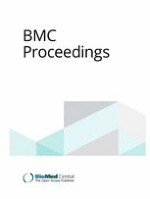Erschienen in:

Open Access
01.10.2016 | Proceedings
A clustering approach to identify rare variants associated with hypertension
verfasst von:
Rui Sun, Qiao Deng, Inchi Hu, Benny Chung-Ying Zee, Maggie Haitian Wang
Erschienen in:
BMC Proceedings
|
Sonderheft 7/2016
Einloggen, um Zugang zu erhalten
Abstract
With the development of the next-generation sequencing technology, the influence of rare variants on complex disease has gathered increasing attention. In this paper, we propose a clustering-based approach, the clustering sum test, to test the effects of rare variants association by using the simulated data provided by the Genetic Analysis Workshop 19 with an unbalanced case-control ratio. The control individuals are (a) clustered into several subgroups, (b) statistics of the separate subcontrol groups as compared to the case group are calculated, and (c) a combined statistic value is obtained based on a distance score. Collapsing of rare variants is used together with the proposed method. In our results, comparing the same statistical test with and without clustering, the clustering strategy increases the number of true positives identified in the top 100 markers by 17.24 %. Compared to the sequence kernel association test, the proposed method is more robust in terms of replicated frequencies in the replicates data sets. The results suggest that the clustering approach could improve the power of nonparametric tests and that the clustering sum test has the potential to serve as a practical tool when dealing with rare variants with unbalanced case-control data in genome-wide case-control studies.